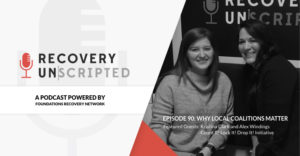Guest blogger from the podcast, Recovery Unscripted, gives us a quick glance into the interview done with two of our CLD team members.

Two members of the Count It! Lock It! Drop It! team recently had a chance to sit down with the Recovery Unscripted podcast in Nashville, Tennessee, to discuss the importance of building local, community-based advocacy for drug abuse prevention.
Program manager Kristina Clark and lead trainer Alex Windings joined the addiction and mental health recovery podcast to share how any attempt to make an impact on a global level must start by serving the local community first. With billions of prescriptions filled in the US each year, it’s more vital than ever to ensure that the community understands what is in their medicine cabinets and how to properly dispose of the prescriptions they do not use. In this interview, Clark and Windings emphasize the importance of spreading accurate information on a grassroots level to equip individuals to fight addiction based on the specific needs of their community.
The first step toward this goal is to gather and understand the evidence-based realities of what’s happening in a community. Through county-based data collected from students in Coffee County, Tennessee, where CLD was founded, the coalition found that 66 percent of students who were suspended or expelled from school faced punishment because of the sharing of prescription medication. This finding surprised the coalition because alcohol was long thought to have been the main source of substance use problems among local students. Furthermore, less than 3 percent of the 66 percent who had been involved with sharing prescription medication reported that they were using these medications to get high. Rather, the majority of these students were using pills in attempts to heal their anxiety, depression, suicidal thoughts, etc. So with the enlightening data provided by these surveys, advocates and officials were able to customize their drug prevention and education approaches to address the real underlying causes of student drug use, such as self-medicating mental health issues.
Along with the DEA, BlueCross BlueShield of Tennessee Health Foundation and other partners, the Count It! Lock It! Drop It! initiative has established permanent drug take-back boxes, events and partnerships across every county in Tennessee to help educate communities on a local level about how to reduce access to leftover pills. And beyond the drug take-back efforts themselves, the broader CLD mission is to continue erasing the stigma surrounding substance use and mental health disorders.
Hear the full conversation with Clark and Windings in their episode of Recovery Unscripted on iTunes, Spotify and the podcast’s website.

Leave a Reply